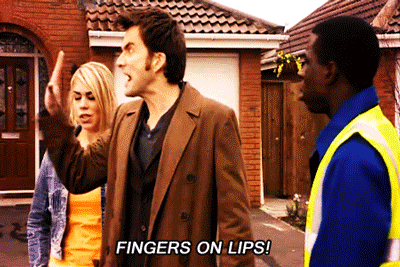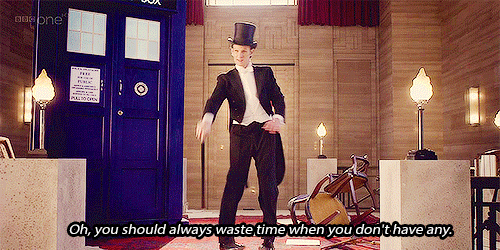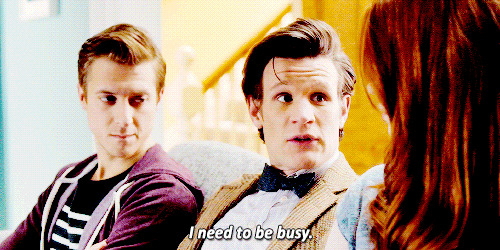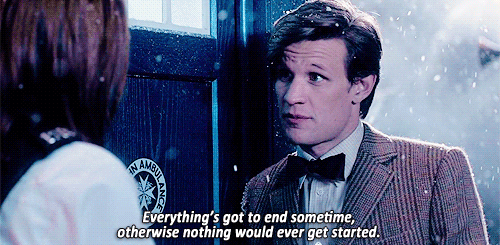One thing you always seem to need is more time in the day. More minutes to get ready, more hours in the day, more days before the deadline.
To be your most productive, time is something you need to control. Treat it as a resource to be managed and manipulated. Or, as Doctor Who once put it: “like a big ball of wibbly-wobbly, timey-wimey…stuff.”
What steps can you take to get more time in your day?
Stop time wasters

Do you futz around on Facebook? Are you playing Candy Crush when you should be number crunching? Digital devices and the internet are an invaluable part of an efficient government workplace, but they also place infinite distractions at our fingertips.
You don’t have to rely on willpower alone to stay focused. There are tools out there to help you carve more time out of your day. Run RescueTime on your computer and smartphone to see how you spend—and waste—your time. Use it to set goals to keep you focused, and block websites and apps that sap your productivity. Though the best RescueTime features aren’t free, investing in more self-aware time management can really pay off. If you just want to block distracting websites, try a browser extension like StayFocusd for Chrome or LeechBlock for Firefox.
Organize the chaos

Over the course of a single day, you might shift your attention hundreds of times. You quickly bounce from one activity to another, from email to a phone call to paperwork to a meeting to yet another email and so on. You might even multitask to try to get two activities done at the same time. This frantic, unfocused fluttering is known as task switching. It may make you look busy and feel efficient, but task switching uses up more of your time, stalls momentum, results in more errors, and stresses you out.
The antidote is to eliminate interruptions. Invest in a pair of noise cancelling headphones. Put up a ‘Do Not Disturb’ sign to alert your coworkers when you need quiet time. When you need to focus, turn off your phone ringer, disable app notifications, and shut down unnecessary software. Batch similar tasks and do them all at once to get them done more efficiently. Set a repeating calendar event that blocks off 1 or 2 hours of time every day to focus on tasks that demand greater concentration, and plan to use that time wisely.
Take breaks

It may seem counterintuitive, but taking time to not work can actually create more time for getting work done. Regular breaks help boost your productivity. One study recommends working for 52 minutes with intense purpose, followed by a 17-minute break. If you think 17 minutes would create havoc in your workplace (will it really?), ease in with 5 or 10 minutes of downtime every hour.
What you do during your break also matters. Turning your attention from your computer screen to your smartphone won’t accomplish much mental restoration. Instead, use your hourly downtime to do a restful, rejuvenating activity. The most important thing to do is get up from your chair. Take a walk with a coworker, do some stretches, find somewhere quiet to meditate, or stroll over to the water cooler and get hydrated.
Repurpose in-between time

Think about all those moments you wait for meetings to begin, for the hold music to end, for the train to arrive, for software to update, or for your lunch order to be cooked. These aimless minutes in between one thing and another add up to hours of found time.
Merlin Mann of 43 Folders productivity system fame called these small moments interstitial time, and offered several strategies for putting it to use. Instead of squandering waiting time scrolling through social media, get something done. Maintain a list of quick to-dos that can be accomplished in just a few minutes, including one-time items as well as smaller tasks within bigger projects. Use interstitial time to unsubscribe from newsletters, enter a few business cards into your address book, do a set of leg squats, or learn a few new words of another language.
Push back on meetings

Internal meetings are the great time suck at any office. They happen too often, assemble too many people, and have too little purpose. And, because calendar tools default to 30- or 60-minute-long events, most meetings are arbitrarily scheduled for more time than they merit.
When you’re the one in charge of the event, send a meeting request for only the amount of time you really need from your colleagues. When you’re on the receiving end of a meeting invitation, ask the organizer if they can shorten the meeting by as little as 5 to 15 minutes. Trim time from several meetings a week, and you can easily reclaim dozens of hours in your schedule over the year.
Lauren Girardin is a marketing and communications consultant, freelance writer, and trainer based in San Francisco. She helps organizations engage their communities and tell their stories. Her website is laurengirardin.com and you can connect with her on Twitter at @girardinl.





This is excellent advice! I’ve found that task switching is one of my biggest struggles and I have to close out of every distracting site (slack, twitter, email, etc) to truly focus. Its amazing the difference in how much more can be accomplished when you aren’t multitasking between 7 different requests or projects.
Thanks Kaitlyn. Focused time is hard to achieve, but totally worth carving out and protecting. A lot of the causes of distractions are within our control. We just have the willpower to turn them off for a little while.
Great post with several easy actionable next steps. I’m excited to try out RescueTime!
Getting a little clarity into where you already spend your time is a great first step to take. Glad to hear you liked my advice, Blake.
I really find taking the breaks in between productive time helps and motivates me to get more done. Thanks for these helpful tips Laura!
You’re welcome, Francesca. Using those in-between times is my favorite way to gift time to myself.